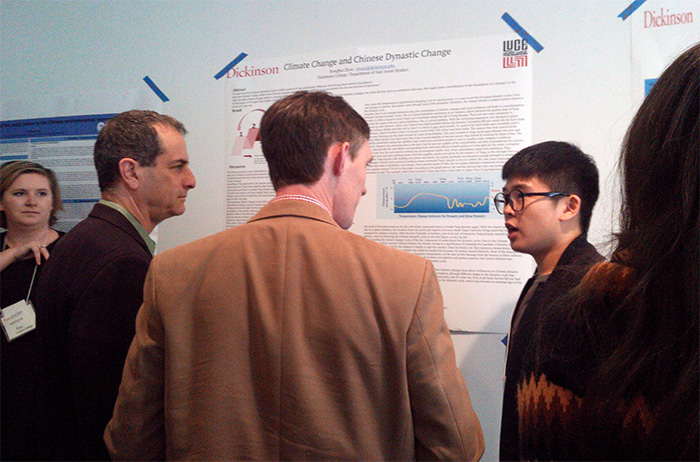Something in the Water

Students present research on Chinese environmental concerns
by MaryAlice Bitts-Jackson
China’s manufacturing boom is revolutionizing more than the global economy; it also has a profound potential impact on the environment—a fact that is taking a front-row seat in current discussions among activists, governmental leaders and policymakers the world over.
Students entered that vital conversation last month when they presented original research at the Asia/Environment Student Research Conference. Held April 16-17 at Bard College, the event showcased the findings of graduate and undergraduate students who investigated this area of international concern.
Timothy O’Reilly ’15 (environmental science) submitted work on Chinese tree-planting programs, and Sasha Reagan ’15 (environmental studies, American studies) delivered research on the country’s food systems, observing the difference between Chinese habits and American food traditions. Andy Vargas ’16 (Latin American, Latino & Caribbean studies, environmental studies) investigated the environmental consequences of coal mining during the past 60 years, while Ronghui Zhou ’15 (East Asian studies) garnered praise from the director of the Bard Center for Environmental Policy for his research on climactic change in light of Chinese dynastic change.
The students were enrolled in a cross-disciplinary course on environmentalism, waterways and Chinese society, which included a two-week field-study trip to China during the winter break. While there, they observed the impact of long-term climactic changes at water-conservancy sites and archaeological sites in the Yellow River area.
The course was taught by Professor of Anthropology Ann Hill, who directs the Luce Initiative on Asian Studies and the Environment (LIASE) program at Dickinson, and by Kelin Zhuang, a geologist who teaches at Dickinson through the LIASE program as a post-doctoral teaching fellow in earth sciences and environmental studies. Zhuang led the trip to China and also facilitated the students' trip to the conference.
"China's economic mode and environmental policy are affecting our whole globe, and by examining [sustainability in Asia] in a critical and adaptive light, students can learn much from both failed and successful practices," said Zhuang, who has taught two courses on this broad topic since his arrival on campus last fall.
Learn more
- “Dickinson Receives $50,000 Grant From Luce Foundation”
- Dickinson Recognized Nationally for Sustainability
- “Confronting the Contradictions”
- Research at Dickinson
- Latest News
Published May 8, 2015